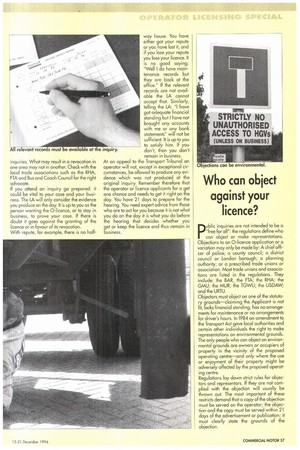Who can object against your licence?
Page 39

If you've noticed an error in this article please click here to report it so we can fix it.
public inquiries are not intended to be a "free for all": the regulations define who can object or make representations. Objections to an 0-licence application or a variation may only be made by: A chief officer of police; a county council; a district council or London borough; a planning authority; or a prescribed trade unions or association. Most trade unions and associations are listed in the regulations. They include: the BAR, the FTA; the RHA; the GMU; the MUR; the TGWU; the USDAW; and the URTU.
Objectors must object on one of the statutory grounds—claiming the Applicant is not fit, lacks financial standing, has no arrangements for maintenance or no arrangements for driver's hours. In 1984 an amendment to the Transport Act gave local authorities and certain other individuals the right to make representations on environmental grounds. The only people who can object on environmental grounds are owners or occupiers of property in the vicinity of the proposed operating centre—and only where the use or enjoyment of their property might be adversely affected by the proposed operating centre. Regulations lay down strict rules for objectors and representors. If they are not complied with the objection will usually be thrown out. The most important of these restricts demand that a copy of the objection must be served on the operator; the objection and the copy must be served within 21 days of the advertisement or publication; it must clearly state the grounds of the objection.
















































































